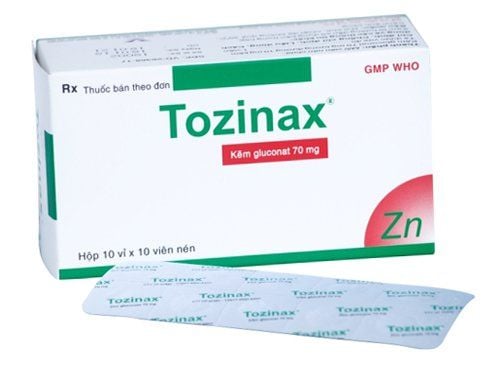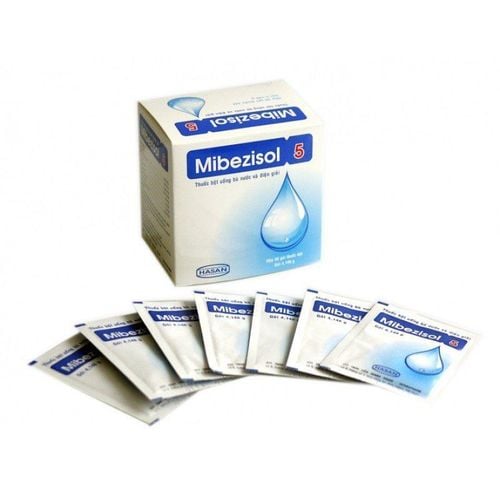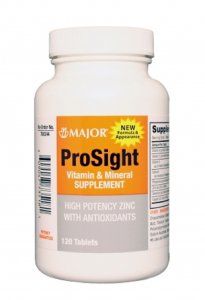This is an automatically translated article.
The article is professionally consulted by Master, Doctor Doan Ngoc Quynh Tram - Pediatrician - Neonatologist - Department of Pediatrics - Neonatology - Vinmec Nha Trang International General HospitalVitamin A supplementation is recommended by the World Health Organization to reduce the burden of disease in children. One method that can help reduce the incidence of diarrhea in children is prophylactic micronutrient supplementation. Zinc is part of the standard guidelines for the treatment of diarrhea, but the role of zinc and other micronutrients in preventing diarrhea is uncertain.
1. Diarrhea in children
Diarrhea is the frequent passage of loose stools. Most children have at least one episode of diarrhea, which usually doesn't last long and is usually easily treated.
However, if not treated promptly and properly it can lead to dangerous complications for the child. Diarrhea is the leading cause of death in children under 5 years of age and can be aggravated by micronutrient malnutrition.
Diarrhea is usually caused by an intestinal infection. The germ that causes the infection is:
Virus: The most common cause. Viral gastroenteritis is a common illness in children. It causes diarrhea, often nausea and vomiting. Symptoms usually last a few days, but children (especially infants) can't drink enough fluids so they can become dehydrated. Rotavirus affects infants and young children and can cause diarrhea. Outbreaks are more common in the winter and early spring months, especially in childcare centers. The rotavirus vaccine can protect children from this disease.
Enteroviruses like coxsackievirus can also cause diarrhea in children, especially during the summer months.
Bacteria: Many different types of bacteria can cause diarrhea, including E. coli, Salmonella, Campylobacter and Shigella. These bacteria are often the cause of cases of "food poisoning," which can cause diarrhea and vomiting within hours of being infected. Parasites: Parasitic infections that can cause diarrhea in children include giardiasis and cryptosporidiosis. Children can sometimes get diarrhea due to:
Diet high in sugar. Food allergies Lactose intolerance Bowel diseases such as celiac disease and inflammatory bowel disease (such as Crohn's disease and ulcerative colitis). Viral diarrhea will go away on its own. Most children with diarrhea caused by bacteria need to be treated with antibiotics. Parasites always need to be treated with anti-parasitic drugs.
Children who are not vomiting or dehydrated can continue to eat or drink as usual. Maintaining a normal diet may even help shorten the duration of diarrhea. You can give your child smaller portions of food until the diarrhea stops.
Do not give your child over-the-counter anti-diarrheal medicine unless your doctor tells you to.

Bệnh tiêu chảy ở trẻ do vi khuẩn cần được điều trị bằng thuốc kháng sinh
2. Micronutrients and diarrhea in children
The effectiveness of zinc in combination with vitamin A or more micronutrients in preventing diarrhea is unclear in African countries with high rates of childhood infection with human immunodeficiency virus (HIV).That's why a study was done with the goal of determining whether zinc or zinc supplementation plus multi-micronutrients and vitamin A reduced the incidence of diarrhea, whether this is different between classes of children who are stunted or HIV-infected.
Researchers analyzed data from a randomized, controlled trial of prophylactic micronutrient supplementation in infants 6–24 months of age. The three groups of children included:
Group 1 included: 32 children with HIV. Group 2 includes: 154 HIV-uninfected children born to HIV-infected mothers. Group 3 includes: 187 HIV-uninfected children born to HIV-negative mothers. All three groups were given vitamin A, vitamin A plus zinc, or multiple micronutrients, including vitamin A and zinc. The primary outcome was the incidence of diarrhea following micronutrient supplementation. The following stratified analyzes examined the statistical interaction between the intervention and stunting malnutrition.
The three groups of micronutrients used in this study were:
Daily Vitamin A. Daily Vitamin A and Zinc. Daily multi-micronutrients, including vitamin A and zinc. The three groups of children are HIV-infected children, HIV-uninfected children born to HIV-infected mothers and uninfected children born to HIV-negative mothers. Supplementation begins at 6 months of age and continues for 18 months.
Each of the three nutritional supplements comes in tablet form, which is crushed into food. Each contains 1250 IU of vitamin A. Two of the three supplements contain 10mg of zinc in the form of zinc gluconate.
Multi-micronutrient supplements similar in strength to those used in other international trials. In addition to vitamin A and zinc, it contains 0.5 mg each of vitamins B1, B2 and B6; 0.9 μg vitamin B12; 35 mg vitamin C; 5 μg vitamin D; 6 mg vitamin E; 10 μg vitamin K; 0.6 mg copper; 150 μg folate; 50 μg iodine; 10 mg of iron as black fumarate and 6 mg of niacin.
Tablets are manufactured by Hersil Ltd (Lima, Peru) and are packaged in blisters of 7 tablets. All supplements are similar in taste, appearance, color, and texture.

Bổ sung kẽm thường xuyên làm giảm tỷ lệ mắc và tử vong do bệnh tiêu chảy ở trẻ
Other research shows that vitamin A supplementation every 6 months reduces mortality in children 6 - 59 months of age and reduces the severity of diarrhea, but has no effect on the incidence of diarrhea Generally speaking.
When used to treat diarrhea, vitamin A does not appear to affect the duration of diarrhea episodes and is not recommended for the treatment of common diarrhea.
Routine zinc supplementation has been shown to reduce diarrhea morbidity and mortality, however global programmatic recommendations for prophylactic zinc supplementation have not yet been established.
Daily short-term zinc supplementation shortens duration (15%-24% reduction) in severity of episodes and is now recommended for the treatment of all episodes of diarrhea occurring in children under 5 year old. Folic acid supplements do not appear to be effective in preventing or treating diarrhea.
In addition, in order to prevent diseases that babies often get, parents should pay attention to nutrition to improve children's resistance. At the same time, add supporting foods containing lysine, essential micro-minerals and vitamins such as zinc, chromium, selenium, B vitamins,... snacks and less digestive problems.
Parents can learn more:
Why do you need to supplement Lysine for your baby?
The role of zinc - Guidelines for reasonable zinc supplementation
Please visit the website Vinmec.com regularly and update useful information to take care of your baby and family.














